Did you know that small cucumbers are not only delicious, but they also offer a range of health benefits? These petite veggies, packed with flavor, are a perfect addition to your garden. Whether you have limited space or simply want a snack-sized treat, small cucumbers are the way to go.
When it comes to growing small cucumbers, there are a few essential tips to keep in mind. From choosing the right variety to providing proper care and harvesting at the right time, you can enjoy a plentiful crop of these crisp and refreshing delights.
The beauty of small cucumbers lies in their versatility. They can be used in a variety of recipes, from salads and sandwiches to pickles and snacks. Plus, their compact size makes them perfect for small gardens and containers.
In this article, I will guide you through the process of growing small cucumbers, from choosing the right variety and planting them effectively to troubleshooting common issues and enjoying the fruits of your labor in delicious recipes.
So if you’re ready to dive into the world of small cucumbers and unlock their incredible potential, let’s get started!
Key Takeaways:
- Small cucumbers offer a range of health benefits and can be a delicious addition to your garden.
- Choosing the right variety is important to suit your preferences and gardening space.
- Proper planting and care, including watering, fertilizing, and trellising, are essential for healthy growth.
- Be mindful of common issues like poor pollination, pests, and diseases, and take proactive measures to prevent them.
- Harvesting small cucumbers at the right time and storing them properly ensures maximum flavor and freshness.
Choosing the Right Small Cucumber Variety
When it comes to small cucumbers, there are several popular varieties to consider. Let’s explore the characteristics and benefits of each:
Lemon Cucumber
The Lemon cucumber variety offers smaller fruits that are perfect for single servings. These cute and flavorful cucumbers are round and yellow, resembling lemons. They add a delightful crunch to salads and sandwiches.
Boston Pickling
If you prefer a classic heirloom taste, Boston pickling cucumbers are an excellent choice. These small cucumbers are known for their exceptional flavor and texture. They are great for making pickles or enjoying fresh in salads.
Armenian Cucumber
Armenian cucumbers are prized for their unique flavor and high yield. They are long and slender, resembling a cucumber-melon hybrid. These versatile cucumbers can be used in various culinary applications, from salads to dips.
Small cucumbers, regardless of the variety, offer several benefits. They are easier to manage in the garden, making them a perfect choice for limited spaces and container gardening. Their petite size also makes them ideal for individual servings, reducing waste and ensuring freshness. Moreover, small cucumbers are rich in vitamins and minerals, making them a healthy snack option.
Now that we understand the different small cucumber varieties and their benefits, let’s move on to planting and growing these delightful vegetables.
Planting and Growing Small Cucumbers
When it comes to planting small cucumbers, timing and proper spacing are essential for a successful harvest. With a little care and attention, you can enjoy the benefits of small cucumbers right in your own garden.
To start, wait until the soil temperature reaches 70°F before planting small cucumber seeds or seedlings. This ensures that the soil is warm enough for optimal germination and growth. Remember to choose a sunny spot in your garden with well-drained soil.
To improve the fertility of the soil, consider incorporating aged compost or organic matter before planting. This helps provide essential nutrients and creates a favorable environment for small cucumber plants to thrive.
Once you’re ready to plant, make sure to space the small cucumber plants properly. Leave 36 to 60 inches of space between each plant, allowing them enough room to spread out and grow without overcrowding. This spacing also promotes better airflow, reducing the risk of disease.
Remember to water small cucumbers consistently, providing approximately 1 inch of water per week. This helps ensure their growth and prevents the fruits from becoming bitter. You can also use a water-soluble plant food to provide additional nutrients for their development.
As small cucumber plants grow, consider using straw mulch around the base of the plants. This not only helps keep the fruit clean and free from soil, but it also deters pests, such as slugs and snails, from reaching the plants. Additionally, straw mulch helps retain soil moisture and prevents weed growth, creating an ideal growing environment for small cucumbers.
Trellising the vines of small cucumbers is another great way to maximize space in your garden. By training the vines to grow vertically, you can conserve space and keep the fruit off the ground, reducing the risk of rotting and damage. Plus, it makes harvesting easier and adds an attractive visual element to your garden.
Overall, planting and growing small cucumbers is a rewarding experience that offers tasty rewards. With proper care, watering, and spacing, you can enjoy an abundant harvest of small cucumbers that are perfect for salads, snacks, and pickling.
Soil and Care Tips for Small Cucumbers
When it comes to growing small cucumbers, providing the right soil conditions and care is essential for their success. These tips will help you create an optimal environment for your small cucumber plants.
Fertile, Well-Drained Soil
Small cucumbers thrive in fertile, well-drained soil with a pH level between 6.0 and 6.8. This ensures that they receive the right amount of nutrients and water while avoiding excessive moisture that can lead to rotting.
Soil Preparation
Prior to planting, incorporate aged compost or Miracle-Gro Performance Organics All Purpose In-Ground Soil into your garden bed. This enhances the soil quality and provides essential nutrients for healthy plant growth. Mix the compost or soil amendment evenly throughout the planting area to ensure consistent fertility.
Spacing and Trellising
When transplanting small cucumber seedlings, space them about 2 feet apart in rows. This allows enough room for their spreading vines and ensures proper air circulation. To optimize growth and fruit production, trellising the vines is recommended. You can use a sturdy trellis or create a support system using stakes and strings.
Moisture Management
Maintaining consistent moisture levels in the soil is crucial for small cucumbers. Water the plants regularly, aiming for about 1 inch of water per week. Avoid overwatering as it can lead to waterlogged soil and root rot. Applying mulch around the plants helps retain moisture and reduces weed competition.
Fertilization
Small cucumber plants benefit from regular feeding. You can use either a water-soluble plant food or a continuous-release fertilizer. Follow the product instructions for application rates and frequency. Fertilizing provides the necessary nutrients for healthy plant growth and abundant fruit production.
Image of Small Cucumber Plant
Troubleshooting Small Cucumber Issues
While growing small cucumbers can be a rewarding experience, you may encounter a few common problems along the way. Here are some troubleshooting tips to help you overcome these issues and ensure healthy small cucumber growth.
Poor Pollination
Poor pollination can result in misshapen or underdeveloped fruit. To improve pollination, consider hand-pollinating the flowers. Gently transfer pollen from the male flowers to the female flowers using a small brush or cotton swab. This can increase the chances of successful fruit development.
Pests
Squash bugs and aphids are common pests that can damage small cucumber plants. To deter these pests, use row covers to protect the plants. Additionally, you can apply straw mulch around the base of the plants to create a barrier. Regularly inspect the plants for signs of pest infestation and take appropriate measures to control their populations.
Diseases
Powdery mildew and wilting are two common diseases that can affect small cucumber plants. To prevent powdery mildew, apply a fungicide at the first sign of the disease. Maintaining proper air circulation around the plants can also help minimize its spread. Wilting can be caused by various factors, including fungal or bacterial infections. If you notice wilting, promptly remove and dispose of affected plants to prevent further spread.
By implementing these troubleshooting techniques and maintaining regular monitoring, you can minimize small cucumber issues and ensure healthy growth.
Harvesting and Storing Small Cucumbers
Harvesting small cucumbers is an exciting moment in your gardening journey. When these delightful little veggies reach the perfect size, it’s time to enjoy their fresh flavor and numerous benefits. Here are some tips on how to harvest and store small cucumbers for the best taste and longevity.
1. Checking for Ripeness:
Cucumbers can double in size overnight, so it’s crucial to check your plants daily. When small cucumbers are firm, have a vibrant color, and are the desired size according to the variety, they are ready to be picked.
2. Gentle Harvesting:
When harvesting small cucumbers, handle them with care to avoid damaging the plant. Use a sharp knife or clippers to cut the ripe cucumbers from the vine, making a clean cut near the stem. Avoid twisting or pulling, as this can harm the plant’s delicate structure.
3. Refrigeration for Freshness:
To preserve the freshness and flavor of small cucumbers, it’s best to store them in the refrigerator. Place them in a reusable bag or wrap them individually in plastic wrap to maintain their crispness.
4. Optimal Storage Length:
Small cucumbers can be stored in the refrigerator for about 7 to 10 days without compromising their taste and texture. However, it’s always recommended to enjoy them as soon as possible for the ultimate freshness.
Remember, regular harvesting encourages continual fruit production, so keep a close eye on your small cucumber plants and enjoy the bounty they provide.
Growing Small Cucumbers Vertically
Did you know that small cucumbers can be trained to grow vertically? By providing them with a trellis, tomato cage, or pea netting, you can help conserve space in your garden and keep the fruit off the ground, reducing the risk of rotting. Even bush varieties of small cucumbers can benefit from vertical support.
To grow your small cucumbers vertically, simply guide the vines onto the trellis as they grow. This not only helps maintain a tidy garden but also makes it easier to harvest the cucumbers when they are ready. With vertical growing, you can enjoy a bountiful harvest of small cucumbers without compromising on space or convenience.
Best Small Cucumber Recipes
Small cucumbers are not only delicious on their own but also a versatile ingredient that can elevate your dishes. Whether you’re looking for a refreshing snack or a delightful addition to your meals, small cucumbers have got you covered. Here are some mouthwatering small cucumber recipes to inspire your culinary creations:
1. Small Cucumber Salad
Enjoy the crispness and natural sweetness of small cucumbers in a refreshing salad. Simply slice the cucumbers into thin rounds and toss them with cherry tomatoes, red onions, and a tangy vinaigrette dressing. Top it off with fresh herbs like dill or mint for an extra burst of flavor.
2. Small Cucumber Sandwich
Upgrade your classic sandwich by adding thin slices of small cucumber for an added crunch and freshness. Layer them with your favorite deli meats, cheese, and condiments. You can also experiment with different flavors by adding avocado, sprouts, or hummus.
3. Small Cucumber Wraps
For a lighter and healthier alternative to traditional wraps, use small cucumbers instead of tortillas or bread. Fill them with your choice of protein such as grilled chicken or tofu, along with crunchy vegetables and a creamy dressing. These cucumber wraps make a satisfying and low-carb meal option.
4. Small Cucumber Pickles
Preserve the freshness of small cucumbers by making homemade pickles. Mix vinegar, water, sugar, and spices like dill and garlic in a jar. Add the small cucumbers and let them marinate in the brine for a few days. These tangy pickles can be a delightful accompaniment to burgers, sandwiches, or charcuterie boards.
5. Small Cucumber Salsa
Get creative with your dips by making a flavorful small cucumber salsa. Finely chop small cucumbers, tomatoes, red onions, jalapenos, and cilantro. Mix them together with lime juice, salt, and pepper. This refreshing salsa pairs perfectly with tortilla chips, grilled meats, or as a topping for tacos and quesadillas.
“Small cucumbers are a versatile ingredient that can add a refreshing crunch to a wide range of recipes.”.
Whether you’re looking to add a refreshing crunch to your salads, sandwiches, or wraps, or aiming to bring vibrant flavors to your pickles or salsas, small cucumbers are the perfect ingredient. Incorporating these “little green wonders” into your meals not only adds texture and flavor but also provides you with essential vitamins and minerals.
Try out these delicious small cucumber recipes and discover how these petite veggies can transform your culinary experience!
Conclusion
Growing small cucumbers in your garden can be a gratifying experience. With a variety of small cucumber options available, such as lemon cucumber, Boston pickling, and Armenian cucumber, you can choose the perfect variety for your needs.
Providing the proper care is essential for the successful growth of small cucumbers. Ensure they are planted in well-drained soil, receive ample sunlight, and are watered consistently. Consider incorporating aged compost or Miracle-Gro Performance Organics All Purpose In-Ground Soil to enhance soil quality and using straw mulch to keep the fruit clean and deter pests.
Once your small cucumbers are ready for harvesting, you’ll be delighted with their taste and versatility in various dishes. Whether you enjoy them fresh in salads, sandwiches, or pickled, small cucumbers offer a range of culinary possibilities. Additionally, they are packed with vitamins and minerals, making them a healthy and refreshing snack choice.
So, why not start growing your own small cucumber garden today? Follow these tips, choose the right variety, and embrace the many benefits of small cucumbers. Enjoy the satisfaction of homegrown goodness and elevate your culinary creations with these delightful vegetables.

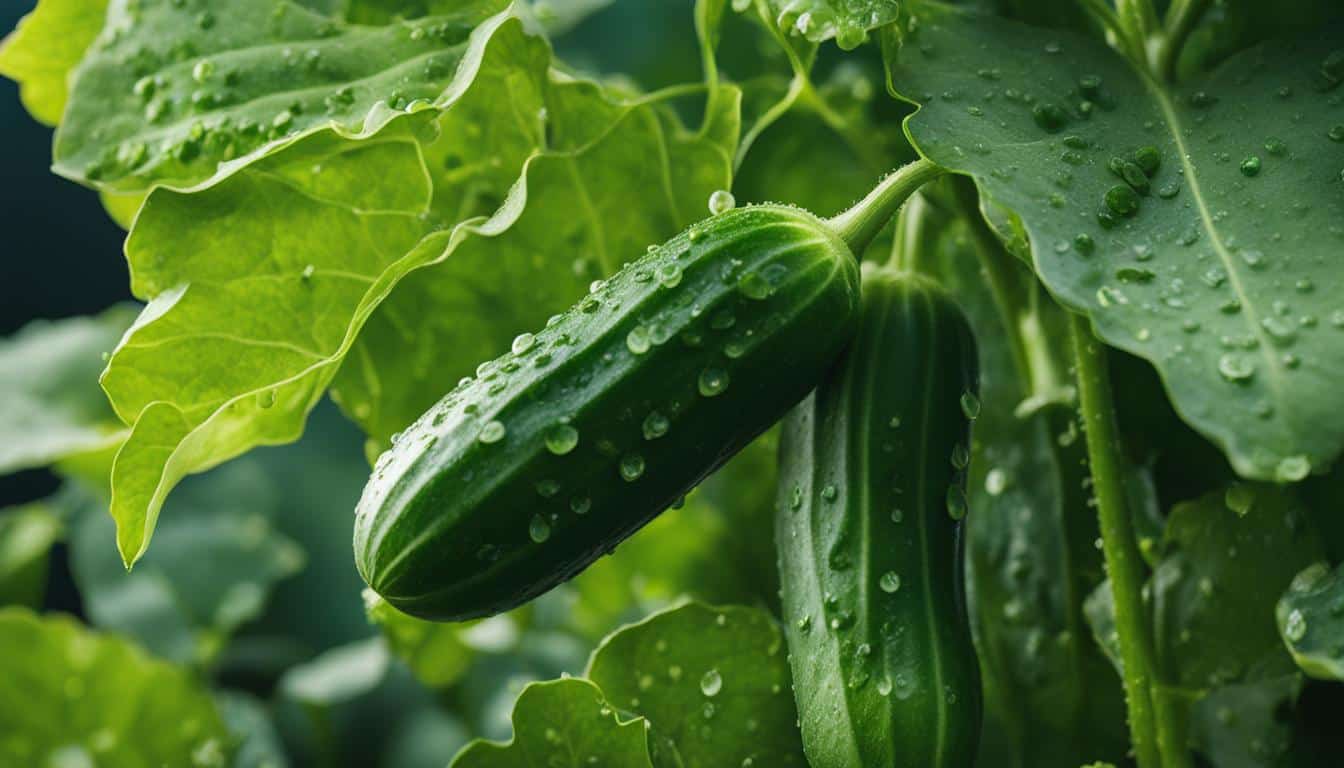
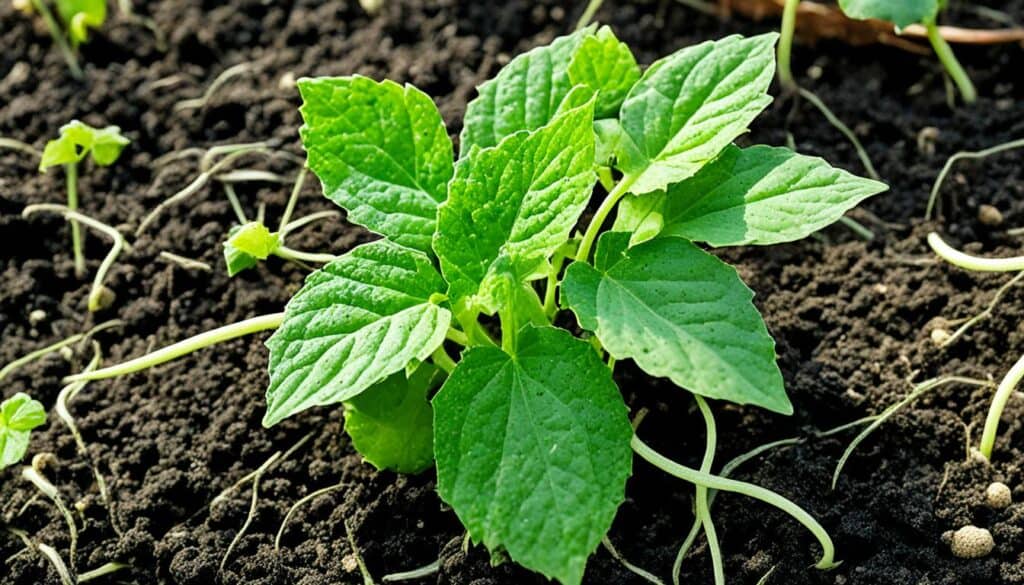
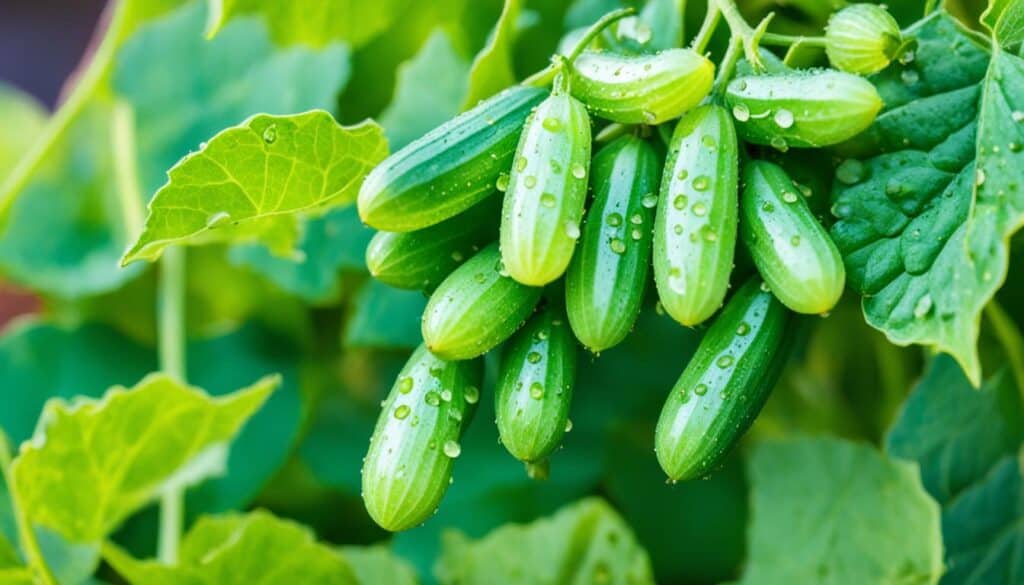
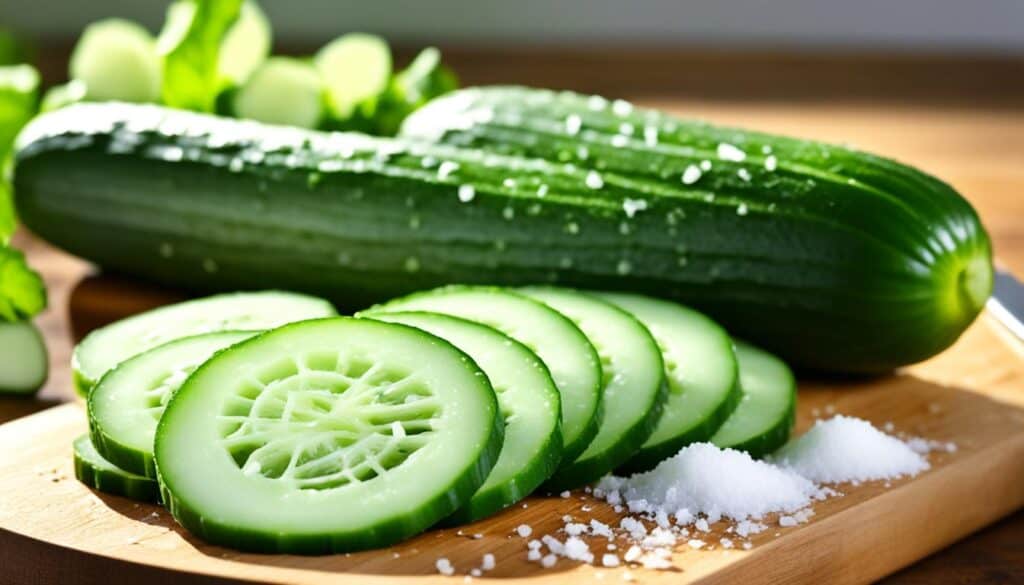
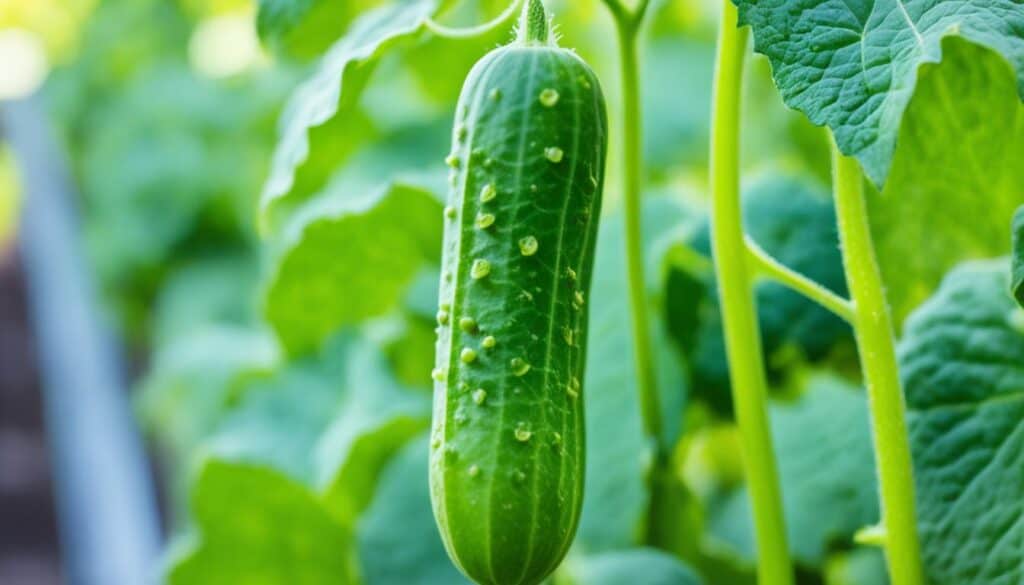
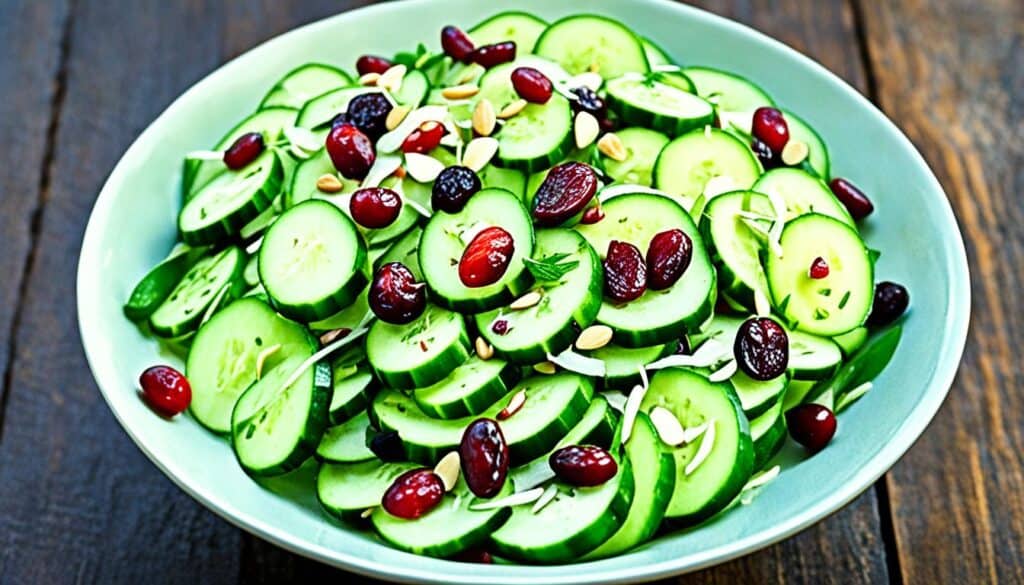



Leave a Reply